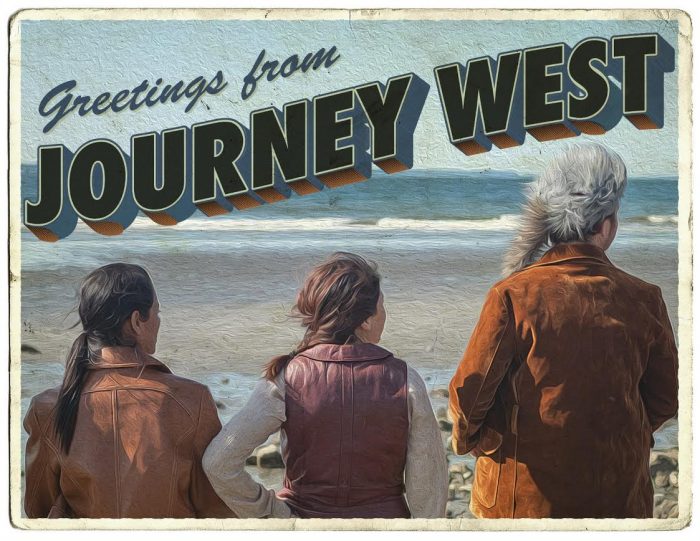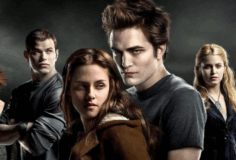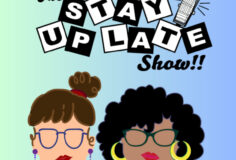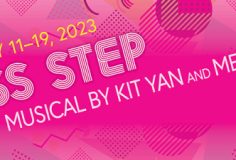
The cast of the new musical, “JOURNEY WEST! The Legend of Lewis & Clark” in rehearsal. The new musical from Copious Love opens June 1, 2018 at Theatre Off Jackson.
On May 17th I snuck into Studio B at the Theatre of Puget Sound during a rehearsal break of Copious Love’s upcoming world premiere of the musical JOURNEY WEST: The Legend of Lewis & Clark by local playwright & artist, Andrew Lee Creech to get a sneak peek of what we’re in for starting Friday, June 1st… Afterwards I sat down with Andrew, and director Linnea Ingalls to chat about what I’d just seen…
Rachel Delmar: That was super fun. I’m so glad I got to peek a little bit before talking to you guys.
Linnea Ingalls : Just a lil’ tease.
Rachel: Just the perfect amount. Now, do tell, how did we get here? How did this show come to be?
Andrew Lee Creech: This initially started off as a 10 minute play that I wrote for a playwriting class while doing my undergrad. At that time it was just a lil’ joke of a play. The whole conceit was that we were going on this great expedition because Thomas Jefferson wanted to find Sasquatch. So, it began as a 10 minute play called LEWIS & CLARK SASQUATCH HUNTERS.
L: Which is not that far from the truth…
A: Right! And so, a theatre company in town called Fantastic Z did a staged reading of it in the back of Highline Bar and audience feedback came in and people loved it, they thought, it was really funny & wanted to see it expanded and one person said ‘it would be funny as a musical’ to which I replied ‘Ha Ha Ha’ & went about my day for a few years… That was in 2013. And then in 2014 I started to circle back to the idea and have been working on it ever since. I developed some of it while working with Parley, a great writer’s group here in Seattle.
R: What personally did you find intriguing about continuing it?
A: I really love research, so I did a lot of Google searches and picked up a lot of books and began reading them. Specifically, the journals themselves, and an amazing book called Undaunted Courage, which recounts the entire expedition with extreme detail and insight. And the more research I did, the more I saw that this was not just an epic story of heroes and the expansion of a nation–it was much bigger. This was a story that was funny, ridiculous, tragic, frustrating, and offensive. And, in terms of white male privilege, imperialism, race relations, gender disparities, capitalism, this story was absolutely reflective of modern day America. I became obsessed. And I began to realize that every time something “outrageous” or horrendous happens in our country, we all get shocked and pissed as if this has never happened before.
L: As if we weren’t founded upon it.
A: Exactly. And when you look back at history you see well actually, this type of thing has been happening since our country’s inception. It’s this idea that if history doesn’t repeat itself it certainly cycles. It spirals, is what i like to say. History doesn’t repeat itself it spirals. It comes back around in a slightly different manner. That was what really hooked me into this play and I started to go, “oh ok, I think there’s something here.” And then I saw that HBO was planning a mini series about Lewis & Clark and then Cole Hornaday introduced me to a comic book that was all about ‘oh we got the Louisiana purchase so cheap because all of that land is actually infested with monsters.
L: Dangerous…
A: Uh huh. It’s this whole graphic novel series about Lewis & Clark going through the West encountering monsters and Sasquatch and I was like oh, I’m tapped into the cultural zeitgeist, there’s a reason that this 200 year old American origin story is coming up.
R: When did Copious Love & Linnea get involved?
A: Copious Love put out a call for musical submissions and I’d been cultivating a relationship with them for a good period of time so when that opportunity came up I pitched the idea at that the time I had the original 10 minute play and 2 or 3 demo songs. They have a great writers group that meets monthly and I took it there. I developed it into a one act and then I officially submitted that.
L: I remember when you submitted it. We’d been talking about it so many years ago.
A: Linnea and I worked together at ACT. That’s where I’d talk about everything. And when the opportunity came up, I went, ‘Hey Linnea, I got this thing.”
They laugh.
L: “I got this thing. You remember that thing we were talking about at work so many years ago.”
A: “How do you feel about directing it?”
R: Tell me your side of the story Linnea. Had you seen pieces, had you read it, where were you at when Andrew came to you?
L: When you came to me I think you had sent me the script, or maybe you just called me, I think you texted me. You texted me.
R: He just tweeted you. ‘Hey Linnea!’
L: ‘You have anything going on this spring?’ There were a bunch of filters on it.
I have always wanted to work with Andrew. And I was very honored that you asked me. And especially reading the script. I was very much struck by who gets credit for what and just the layers upon layers of privilege and marginalization. I was really drawn in by how hilarious the script was.
It’s the incompetence of white men taking credit for the women and the POCs of the group and they are the ones who made it happen. Lewis & Clark in reality were extraordinarily lucky. In the spiral of history, the people who actually made that trip work are not getting credit for it. Which is true of most things.
A: The more research I did the more and more I saw was this story was an American Origin story, a history story, of two heroes but really it’s an American origin story about a couple of white guys who bumble their way to success. They travel an entire continent handing out eviction notices. And lucking the fuck out. And then at the end of the day 200 years later we’re still like LEWIS AND CLARK. THOSE GUYS.
I started to get pulled into this story of how do we tell our stories about the past, and if history is written by the winners, what does it look like when its told through the lens of the losers. Or the disenfranchised, the forgotten even. And at the end of the day who gets attribution.
L: It’s so interesting about SACAGAWEA. She’s lauded as this person who helped them, guide them through but she was literally a captive. It was not her choice to be there.
R: It sounds like you could make a whole series of this. Picking a historical figure and finding out who is actually the person [people] behind getting them there. There’s a lot of that happening recently, where we’re like, hold on, what actually happened?
A: That’s why I really wanted to examine our current culture and social climate through the lens of our past. This is for people who are shocked with what’s happening today. I CAN’T BELIEVE THAT WE’RE STILL TREATING WOMEN THIS WAY. And well, no we’ve been doing that. That’s a thing. I CAN’T BELIEVE WE’RE STILL LOOKING AT PEOPLE OF COLOR AS LESS THAN. Well, if you actually look at the facts, Lewis & Clark had a slave on the expedition, who worked just as hard, if not harder than other members of the expedition, and was rewarded nothing and remained a slave long after the expedition had ended.
I really wanted to examine what’s happening today and say we’ve been ignoring women and POCs for years. This is not new. Examine your history.
R: Have you written a musical before?
A: So…
Linnea and I giggle.
A: Yes and no. I’m gonna get real with you right now ok? The first musical I wrote was a protest on standardized testing back in High School. Here in Washington we have a test called the WASL. And I thought, as someone who dealt with learning disabilities throughout my childhood, I don’t believe there is one way to truly measure brilliance. You can’t say here’s the “Be All End All Test”. So I wrote this musical called WASL: The Musical. Which was just a bunch of HS kids going through HS crap and then freaking out about the WASL.
L: That’s crazy because starting in 4th grade I freaked out about the WASL. And my dad would say – don’t freak out – it’s just a dance – do the WASL! [does a dance] See. We could have combined forces. I had the choreography.
A: That would have been great!
R: Do you write your own music?
A: Yes. I started out writing it by myself, but once I got the go ahead from CP I reached out to Evan Barrett, who I went to school with. He’s a fantastic actor, musician, and another person I’ve been wanting to work with for a very long time. And he said yes.
R: I love when people say yes.
A: And honestly that’s the thing that warms my heart so much is that most of this process has been all about people saying yes. To the most outlandish things, the difficult things. This script is hard because it deals some hard truths – it’s silly and campy and fun and farcical but it dips into these moments of true rawness and we gotta go there.
L: One thing I said to the actors was this show is going to give people whiplash. Because we don’t let them off the hook. Which I really love a lot. Because we’re living in this happy fantasy world and then we get some really harsh reality. The ending doesn’t let you off the hook from that. I really appreciate that it makes you look at this without there being a happy ending. Well, it’s a happy ending for certain characters.
R: What should the audience expect? It’s a history play but we’re not going to see Henry VI Part 3. It’s a musical romp of some kind. I just saw that. What kind of theatrical world are we living in?
A: Well. My initial response is ‘We’ll let you know!’ But something Linnea and I have talked about is this idea of challenging what you’re hearing versus what you’re seeing. Is the dissonance of what you’re experience. That’s the world. You might be seeing something silly and ridiculous happening in front of you but you might be hearing something heart breaking.
L: The actors are living in this very, very, real world. But there is an absurdity for us as the audience. And we have to grapple with the fact of, look at this historical origin story & the foundation of our country versus what actually happened, what is the actual impact, and what do we have to own up to as white Americans.
A: In Son of a Trappin’ Man [one of the musical numbers] you are seeing the beginnings of Industrialization. Commercialization. You’re seeing the moment in history where Americans decided to value product…
L: …and money…
A: …and things, over animal life, over human life, over nature. But you’re seeing this joyous song, singing about killing animals and looking good, but something sinister is happening underneath that.
R: It was very Gaston [from Beauty & the Beast]
A: That’s a pretty cool observation. A lot of the music and structure should feel Disney-esque. Because I really want this to feel like a good ol’fashioned American musical. Because you’re dealing with material that you can’t really enjoy.
L: Seeing the destructiveness of white Americanism through the most American art form.
R: You’ve touched on it a bit but to hone in, why are you doing this play now & why should people come and see it?
L: The reason I wanted to sign on is that it essentially affects how we see the foundation on which our country was built. Which, colonialism, racism, and that our biggest heroes are also villains. It’s a lot of things. A lot of levels of privilege. White feminists are not left off the hook either which I appreciate a lot. I think what Andrew said about the spiral this interesting way that he’s set up the script where we as a cultural are so focused on happiness and we are the best culture and the best nation and we just pass over these tragedies so quickly and we don’t learn anything from them. You do that with the structure of this show and that’s where that whiplash comes in – we pass over these dark moments so fast and get to the buffalo ballet – there’s a buffalo ballet –
R: Spoiler!
L: Horrible things happen and then I won’t spoil it, but we go into this really hopeful soulful song. We just go so fast and it’s a reflection of how we deal with national tragedy and national disgraces. It’s like oh nope, we’re fine. We’re still the best country ever. And we’ve never made any mistakes!
A: Everyone wants to have ownership of their own story. Especially in a nation that’s so big. Everyone has these wants and desires and feels entitled to all these things so how do we have a conversation together when everyone is raising their hand saying but me but me but me? So it’s a commentary on how short our attention span is. We have these tragedies happening but wait Kanye West tweeted a thing. Now all of a sudden no one is talking about the tragedy anymore. Now we’re wrapped up by Kanye West. And by the time we circled back to the original issue there’s a new issue on the table and nothing has been accomplished. It’s a history play showing, well these are the things that happened and we passed over them and now today we’re acting like we’re surprised.
L: And we’re just going to pick and choose from this origin story for what fits our needs the best to keep certain people in power.
A: Come see our show! There are a lot of dramas happening right now, a lot of great dramatic inclusive work, but we’re in a time where SNL, sketch comedy shows are struggling to keep up with, to write material that is better than what’s happening everyday with this current administration. I figure, we’re already living in a cartoon world, might as well embrace it. The show is pee-your-pants funny, heartbreakingly tragic, supremely uncomfortable, and absolutely ridiculous. Plus, Evan and I have cooked up some rockin’ tunes.
L: You will have fun watching the actors live in their world. And be funny.
R: I had a lot of fun.
And I did! Seeing the rehearsal as well as chatting with these two intelligent, hilarious, talented artists, I could see just by the way they jived off of each other, slipping in and out of each other’s responses that they have a very unique and well balanced theatre making relationship. And I can’t wait to see what they’ve created for us. JOURNEY WEST: The Legend of Lewis and Clark opens this Friday, June 1st and runs until June 23rd at the Theatre Off Jackson. Get tickets HERE!






















